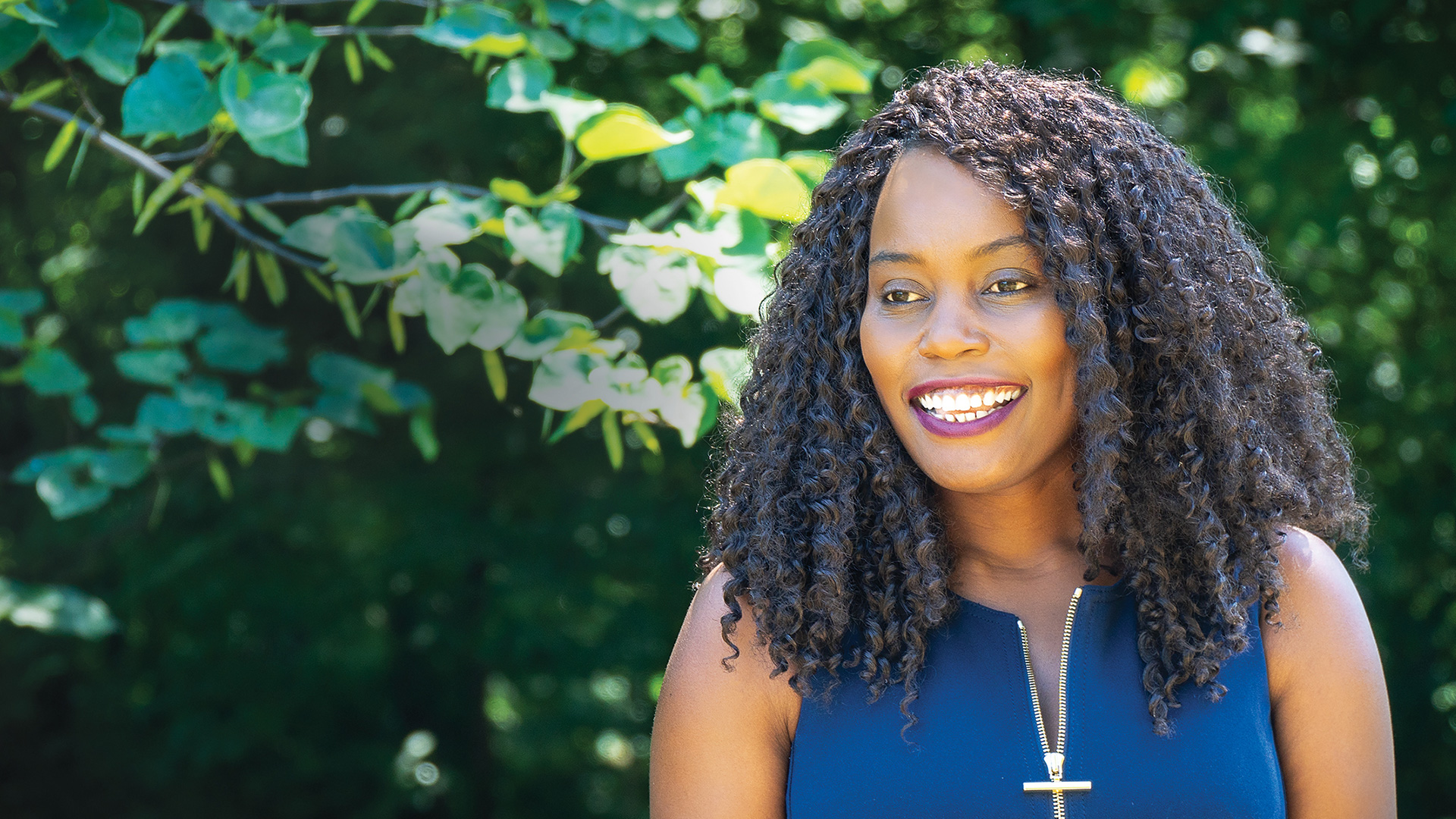
Nancy Mwirotsi
Nancy founded Des Moines based Pi515 to empower refugee and underserved youth through teaching technology skills and fostering supportive learning environments focused on innovation and critical thinking. She believes that access to education, technology and active engagement with tech companies can unlock the potential of her students and prepare them for future-ready jobs in Iowa.
Can you describe the path you took to where you are now?
Well, my path has been interesting. When I decided to start Pi515, I was a single mother who had just come off this big dream of wanting to do a magazine. I had put all of my money there. And then, all of a sudden, I’m walking with my kids thinking about an interview I’d done. One of my friends, Juliana Rotich, had a startup called Ushahidi, a crowdsourcing platform. CNN and Twitter had just talked about her being one of the top people in Africa technology. I’d asked her, “How did you get there? We grew up together!” I had done tech, dropped out of tech. She was talking about what they did, and she made it sound so easy. That was my aha moment. I was like, if she can do it, I can try to do it. But use that opportunity to educate kids.
What were you doing before you started Pi515? What were you interested in?
I remember I really liked C++. That was one of my best programming classes, and it’s because I really liked the teacher. The first project we ever did was making your own calculator.
I feel like back in the day, careers in technology were not as diverse — or maybe we just didn’t see how diverse they were. And they really felt not so inclusive. I felt like it was always meant for a particular group of people. If I had known those things a little earlier, I think I probably would have been an innovator. Because every day I’m sitting down and thinking, how do we streamline processes, and how do you look at things a little different?
Starting Pi515 taught me to be very ambitious, and to follow the dream, just go for it. If you fail, it doesn’t matter. I always believe that if you start something, the right people will come along. Some of the people who have allowed me to pursue what I’m doing are people I met just three or four years ago. They fell in love with the vision, and we’ve been in it together.
Tell us about Pi515. What is it, and what inspired you to create this organization?
I wanted to start an organization that was STEM related mainly because I saw that we had a system where a lot of refugees were coming, and nobody was looking at what success is going to look like for those kids. The boys had soccer; the girls had nothing. So I started a dance class for the girls, and then I realized maybe I can transition this program into tech. But do it our way.
One thing people don’t realize when you’re teaching technology to underserved youth — and I wouldn’t just say underserved youth, but also kids from rural Iowa — is that most tech curriculum is built for kids who already have all the skills and the technology at home. So for us, when we look at technology, we need to be able to teach realizing these kids probably don’t have computers at home. Realizing that the only use of technology they have is maybe through a cell phone. So digital literacy is a big, big thing for us.
When I started Pi515, I came up with the idea of starting an organization that was going to be innovative in terms of inspiring people to consider tech. We have some classes that are fully structured, but we have others that are not. For example, we are building drones with some of my students. If you came to that class, you’d be like, what are you guys doing? But guess what. All those kids are coming back next year, and they’re already saying, hey, we’re doing this — but we’re going to do it in 3D. They already have ideas of what they want to do.
I wanted to start a program that makes kids feel like they belong in an industry that sometimes can be very biased — especially for minorities and women. That’s why we started a girls-only class sometimes, and we encourage more girls, because I want them to see that they can be in tech too.
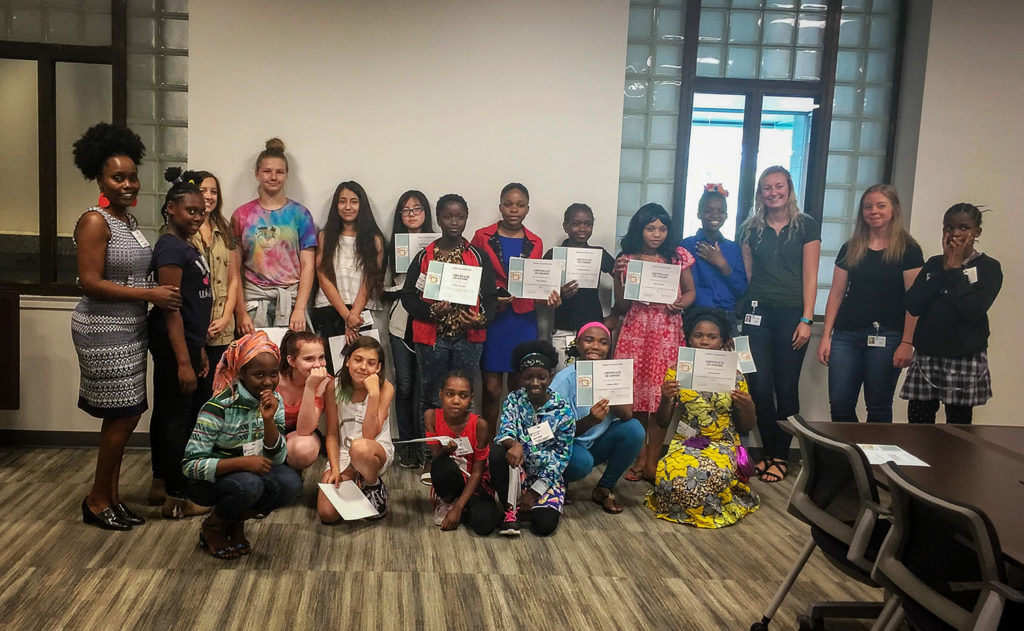
Tell us about Pi515’s focus on serving young refugees.
We started mainly with refugees, which has been big for me, and I really push for that segment. But I realize that we are also very good in low-income areas. When we go into schools, we really focus on low-income students. We just had a strategic meeting, and we’re pushing to have 75 percent be refugees, 100 percent low-income students, and 65 percent girls. So we work with kids who are not refugees as well.
So why Iowa? Why start Pi515 in Des Moines, or in the 515?
When I came up with the original idea of Pursuit of Innovation 515 [Pi515], I actually looked at a map to describe my area. My biggest concentration is advancing kids inparticular areas so that they can get out of poverty. And I feel as soon as we can get STEM education for these kids, that’s the best way. We want to be in the tough schools, and sometimes that is really challenging. Your location doesn’t determine your success. My hope is that as we continue to be present in these schools and help others understand, we will be able to heavily invest in these areas.
How has the Des Moines community supported your work ?
We’re sitting here in a church [Zion Lutheran Church in Des Moines]. When I first started, I never thought it would be a church that would give me a space. I used to think it would be the schools; and then I thought, oh, some businesses will say, “Here’s a building — come do tech.” It’s been interesting to learn that you take help from wherever you get it.
We have some great people in the startup community who have been very supportive. When I first started, someone had written a story about us on Silicon Prairie News. Ben Milne, founder and CEO of Dwolla] reached out to me with a one-line email saying, “We’re here to help.”
Brad Dwyer from Hatchlings and Tej Dhawan at Principal have also been incredibly supportive. Because we don’t get government money, it’s good to see when people buy into what we’re doing. It’s not easy by any stretch. I’m championing a group of students that are really underprivileged, and sometimes it looks like everything is against you. So for me to have these guys come and say, “Hey, we’re your brothers and we’re supporting you on this journey,” that has been one of the most incredible things ever.
And then we built an amazing grassroots movement of women who are not in technology but they believe in the mission. If I put on Facebook today that I’m looking for five computers, chances are I might get twenty. They are just so supportive. They love what they do, and they love the kids.
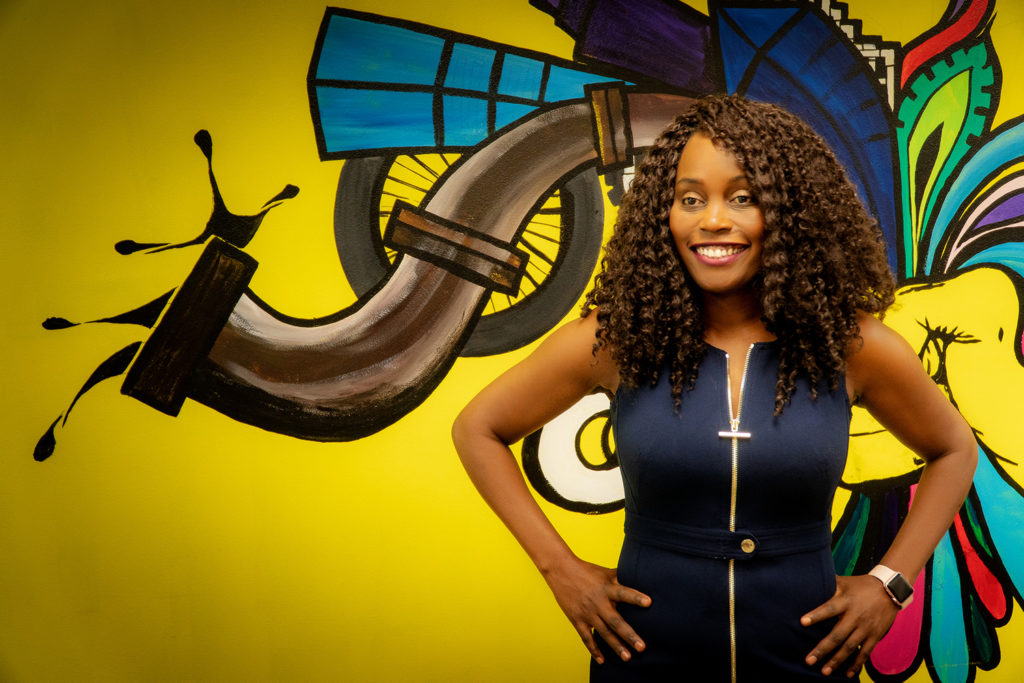
If we’re going to really build a tech workforce that stays in Iowa, those companies have to be in the classrooms with us.
You’ve been building Pi515 for four years now. What challenges have you faced?
Yes, this past April marked our fourth year. For me, the biggest thing has been making assumptions — thinking that, here’s the product, and people will buy into it. Then you realize that you need to sell a product. And also be okay when somebody says no or rejects you, and learning that that is not failure. There were a lot of rejections in the beginning. I felt like I always had to explain everything — even the demographics, why we’re doing STEM. Now we’ve had great media coverage, though, national and local, so I don’t feel like I have to explain myself as often anymore.
The challenge has also been financial. We strategically decided to go a different route by not seeking government funding. Last year we did a giant Jenga tournament, which was really fun, and we raised some money with that. It’s strategically trying to figure out how you financially fund the program.
We’re hearing a lot about Iowa’s low unemployment rate, and there’s a significant need for technology talent. Do you encourage your students to think about establishing their careers here in the state?
Yes, and that’s big for me. But when you talk about low unemployment, you also have to ask, who does that apply to? Because when you look at minorities, people of color, there is huge unemployment. So we have to consider which segment we’re talking about. With the kids we work with, there is either underemployment or unemployment in their families.
Another issue we’ve noticed is that most of the kids have parents who work about forty-five minutes away. Our goal is to try to see how we can change that. Most of the kids we work with are going to be the first in their families to actually get some kind of education. When you give them an education when they’re still young and deciding what to do, it’s easy to encourage them to follow a certain path.
So we encourage them to stay local, mainly because it’s actually cheaper to stay in Iowa than go someplace like Atlanta or Chicago. And when I look at people creating things — Dwolla for example, or Hatchlings, or Workiva — those guys are Iowans, and they created it here. We need to be able to know that there are creative people around us so that we can groom that talent, and creativity. I really encourage kids to stay here.
What we are trying to push this year is a partnership between the kids we work with and companies. For example, American Equity came into one of our classes at East High School. Their IT team taught a class and provided job shadowing on networking. Those kids are growing up knowing about this company here in Des Moines. They’re coming back next year when we start again, and they’re building a presence with these kids. Roosevelt just reached out to us asking if we can do the same thing there.
I think when you do that, then kids know for a fact those jobs are here. I know most tech companies are saying, well we don’t have the talent. They actually do have the talent. I feel like sometimes tech companies don’t realize the talent is there; they just need to reach out to find it. And you need to reach out when the kids are young.
What advice would you give a young person considering tech or a person looking to transition into tech, like you?
Believe in yourself. Believe in your craft and believe in the problem you’re trying to solve. I think a lot of young people are all about tech because they think it’s about money. I look at it differently. I think it’s about creating solutions or improving processes. If you’re coming into it thinking, “I’m going to make a startup tomorrow and be a multimillionaire,” I think you’re in it for the wrong reasons. But if you’re coming at it in terms of “we’re solving a problem,” you’re actually going to realize that there are a lot of problems that still need to be solved. A lot of processes that still need to be improved.
I know Pi515 is heavily tech focused, but one thing I didn’t realize was that we’re actually grooming young doctors. We have two girls at the University of Iowa right now doing neuroscience. One of them I thought was definitely going to be an engineer, but she’s doing biomedical engineering right now. It’s a matter of just keep introducing new things to kids, and then they’ll narrow it down to find exactly what they can do.
Believe in yourself. Believe in your craft and believe in the problem you’re trying to solve.
A big part of your mission is mentoring and guiding your students. What inspires you along that journey?
Their successes inspire me greatly and actually motivate me. I am always championing somebody every day. I think it has to be intentional — especially women championing women. I feel like we don’t do it enough. If we can’t just say, “Hey, by the way, you’re doing great,” who else is going to celebrate them? My challenge to men as well is this: we have to celebrate women because we also have daughters, grandchildren, wives, etc. If we don’t have a system that celebrates and encourages more women to build their own businesses, who does that for our own kids? So we have to start that now.
I’m very intentional in terms of championing and mentoring young people. I do mentor a lot of kids, and I’m very proud of each and every one of them because their successes go above and beyond what I expected them to do. They just do these things and make me feel like, wow. They did it.
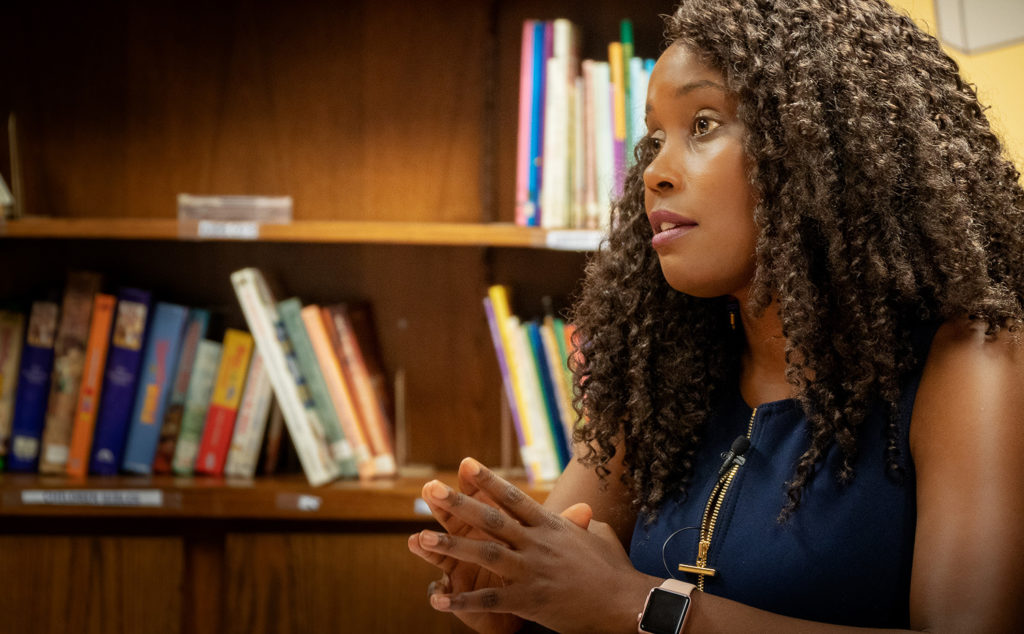
I think it has to be intentional — especially women championing women. I feel like we don’t do it enough.
What current Pi515 projects or initiatives are you excited about?
We introduced something this year called Building the Tech Pipeline, where we’re really pushing partnerships between schools and companies. Bringing tech people into classrooms is going to be a big focus as we go forward, because these kids cannot be people they don’t see.
I always use this example of soccer. Everybody watched the World Cup, right? Soccer coaches are like champions. If they see a kid is so good, they go above and beyond for this kid. I want tech to be the same — especially here in Iowa. Bring these companies inside the schools, and those kids will forever remember that experience. If we’re going to really build a tech workforce that stays in Iowa, those companies have to be in the classrooms with us. That’s our biggest push this year: recruiting more companies that can be with us in the classroom.
What’s on the horizon for Pi515?
I want to start a platform that showcases people’s talents and where that talent is. The idea came because I noticed that Africans especially don’t get recognition for the things they do. For example, in the Des Moines hospital system, we have an African-educated neurosurgeon. African immigrants actually contribute greatly to a lot of economies, and people don’t realize that. I know someone from Kenya who works for Tesla, and somebody from Nigeria who has a big job at Facebook. So I want to create a platform that actually shows those talents, and maps out where those talents are.
We also want to provide more mentorship, so encouraging the kids who are doing great things to mentor the younger ones here. Sometimes people make it and they forget to give back. I want to be able to remind them that if you’ve been given that opportunity, pass it on. Pay it forward.
Another thing I’m excited about is that we’re coming up with a series of books that are very relatable to African kids. Even in the continent, sometimes children’s books do not showcase those kids. Growing up in Kenya, my favorite books were Nancy Drew, and then once in a while I’d read Hardy Boys. But those stories are so unrelatable to the continent. They talk about snow, and we don’t have snow there. So we have a couple people trying to work on those things, creating content that represents who these kids are.
What do you think are the biggest challenges facing your students as they take the next steps in their academic experience and then further on in their careers?
Two big challenges that we need to be addressing right now are digital literacy and digital divide. With the refugees, I expected it. When we went into the schools, I didn’t know how big of a challenge this was. We’re telling kids: you should do this; we know that 82 percent of all future jobs are going to be tech related. But those kids can’t even attach an email. It’s a big concern. The schools are so underfunded right now, so we cannot expect the schools to be the only ones handling this.
In terms of digital divide, I’m talking about kids who don’t have access to a computer at home. When we go to a class, the first thing we ask is, “How many of you have computers at home?” Only maybe one out of fifteen raises their hand, depending on the school. My focus would be communicating to tech companies that before they get rid of that laptop, they should consider refurbishing it and give it to a kid in the city who needs it. I’m excited about Microsoft providing free Wi-Fi in Valley Junction, but I really wish we could do it in more areas, because there are more kids who absolutely don’t have access to Wi-Fi.
I know this girl who just graduated who didn’t have Wi-Fi at home, so she’d sit outside the library after it had closed, finishing her homework. If we want these kids to succeed, we have to realize that tech is a big part of it.
So to anyone who says, “We’re championing STEM or computer science education,” — tech companies, even the governor — I say, “We need to do more.” We can have classes, but if we’re not equipping kids to take those classes, and offering the right support, and making sure that the curriculum correctly assumes their skills, we can’t move forward. That’s our biggest issue right now. We can introduce kids to these skills, but we need the support.
Two big challenges that we need to be addressing right now are digital literacy and digital divide.
What changes do you hope to see for the future of technology education?
Starting with computer science is great, but we really need a good curriculum. We have to think about future-ready jobs in the sense that those jobs sometimes are not in existence today. That’s why we partner with companies like VictoryVR, a Davenport company that does virtual reality curriculum — because I want these kids to see the future today. We need to incorporate future tech like AI, IoT, and machine learning as much as we can, not just the traditional stuff.
What solutions need to be implemented to better equip underserved students so they can equitably access higher education and be able to fully participate in the technology economy?
Kids need to see people in technology in front of them, number one. Number two, we need to provide them with technology equipment at home. It’s not just about education; you might need to do other things too so kids can realize their potential.
I don’t know of any kid I’ve met that isn’t smart. They are very intelligent, and once you give them that opportunity, they just go with it. They have to know that if things are challenging at home, you’re there for them in their educational journey. For example, if you have a single mother and she works a lot, she might not be able to attend parent-teacher conferences. We try to educate the parent and tell them that being there is important. You have to do an all-around approach — have conversations with the parents, coordinate with the schools, and also get support from the community.
What’s your vision for building a more inclusive technology community?
We have to be intentional in introducing new things to people. I know so many people who are doing great things in tech, but sometimes I feel they will never have an opportunity to showcase what they have done. We have to be very intentional about sharing that, especially when it comes to minorities and women. Diversity is a great thing. When you bring diversity to the table, you’re bringing new ideas, different conversations. And it makes your company competitive.
You’ve been a vocal and active advocate for helping your students access and afford higher education. Specifically, you’ve mentioned in past interviews that you’ve helped five of your students collectively secure $200,000 in scholarships. How could we scale this kind of support to ensure more kids have these kinds of opportunities?
I didn’t make it happen; they made it happen. But if you show them how to look for scholarships, if you just tell them that they can do it, they go for it. We’ve had workshops to help students plan for college. School counselors are busy, and they can’t always get to all the students. So it’s important for us to have conversations about goals and remind students that scholarships are available. We need to be able to help students write an essay. We encourage them to write, and we have people look over their essays. I think if other people would find ways to help schools, like help counselors run an essay day, that would really help a lot of kids get into college. The money is there—you just have to look for it.
What kind of groups or activities are you active in outside of your job?
I’m interested in a lot of different activities, but they all align to what I want: people empowerment.
If you weren’t in tech education, what would you do?
I think I would be a lawyer. Growing up in the continent of Africa and seeing the injustice that happens, especially when it comes to a place like Congo — there have been over 5 million deaths there — it’s because of the need for technology. Most people don’t realize that the thing in your phone that makes it vibrate is mined in Congo. There are so many injustices that happen because of that. Refugees have stories. I have a girl in my program who is one of the coolest kids. You wouldn’t realize that she witnessed her mother and two siblings get killed. She’s from Congo. When I look at things like that, I think I would’ve been a lawyer because it really bothers me that we can stand for that.
What kind of impact do you want to have within the Iowa tech community?
My impact is the idea that diversity is very attainable. We just have to make it happen. I think we have to redefine the term sometimes. Diversity is not just about race — it’s also income. It’s geographical. For me, when I look at diversity, I’m not only looking at underserved youth; I’m looking at rural Iowa, inner city kids, race, women. It’s very attainable. So I hope that whatever little thing we’re trying to do will make people see the importance of including young people in conversations and giving them the opportunity to prosper in communities. I hope we are teaching companies to look at inclusion in a different way.
What kind of legacy do you want to leave?
If there’s any legacy I want to leave, especially for my daughter, it’s the same legacy my father left me. He helped me learn about giving back, caring for people, and being humble. Pursuing your dreams and goals. Believe in yourself, go forward, and the right people will come along. And always do good. It pays. You sleep happy.
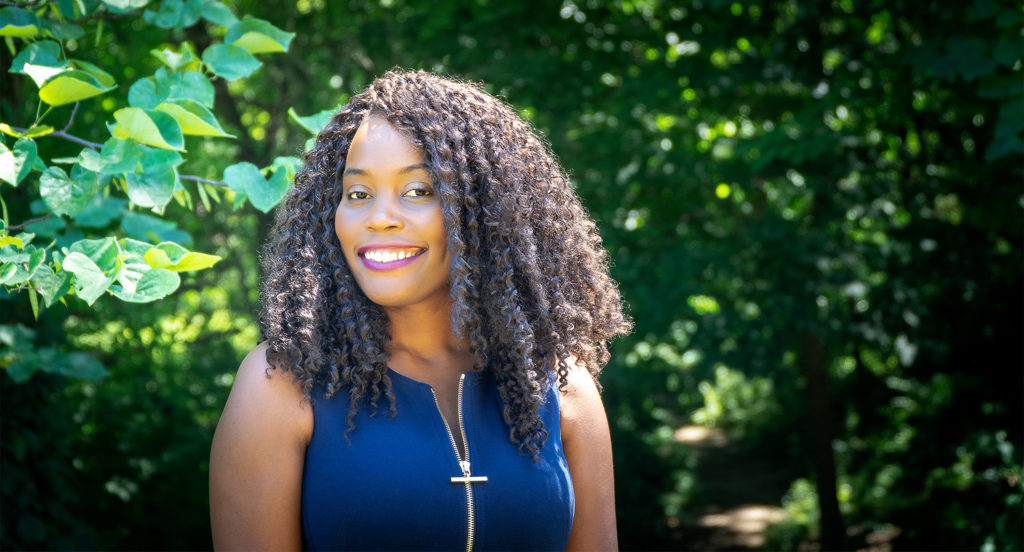
Diversity is a great thing. When you bring diversity to the table, you’re bringing new ideas, different conversations. And it makes your company competitive.

